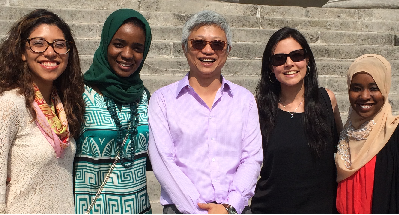WONCA SIG on Health Equity September news
Welcome to the WONCA Special Interest Group on Health Equity news. In this edition we would like to share with you our excitement towards the upcoming WONCA Europe conference where we have been invited to host a Health Equity workshop. In addition to this, our convener shares with us some interesting and related experiences this summer.
Save the date: SIG Health Equity Workshop in Istanbul
In the upcoming WONCA Europe Conference in Istanbul, due to take place on the 22nd-25th October, 2015, we will be conducting a Health Equity workshop. Here, we will asses the use of Primary care as strategy to tackle health inequities in Europe.
This workshop will enable the participants to:
- Understand trends in health inequity across Europe and European primary care systems;
- Reflect on the role of primary care in reducing health inequity;
- Consider specific actions that can be taken to improve health equity, based on experience in different countries.
We will be sending out details later regarding schedules and location. Keep a look out through our mailing list and blogs. We look forward to seeing you and hearing about all the different experiences and ideas.
As always we welcome contributions from anyone who shares the same interest in us in the strive for health equity. If there you have any interesting experience, or materials you would like to share, or you are interested in subscribing to our mailing list, feel free to direct your emails to:
SIGhealthequity@wonca.net
Reflection: UCL Summer School on Social Determinants of Health (29/6- 3/7/2015)
During this summer, our convener was invited to UCL Social Determinants of Health Summer School run by Prof Marmot’s Centre on Health Equity in London, which attracted 48 delegates from across the world including the USA, Europe and Asia. The summer school was opened with Sir Michael Marmot himself with presentations and discussions into the various aspects of social determinants of health.

Through interactive discussions the summer school highlighted the vast expanse of health equity right from biological and social foundations all the way to macro-level of global governance and health policies. Topics included a focus on health inequity of psychological stress, early childhood development, but also health equity in disability, and within gender and health.
“It was certainly very informative and stimulating. This summer school was very useful for me as the Convener of Health Equity Special Interest Group." - Dr William Wong
Image: Dr William Wong (Centre), with other members of the Summer School
Food for thought
Discrimination and Health Equity
Our world, becoming ever more globalised brings about continuously changing dynamics between and within countries; shifts in cultural and societal dynamics are inevitable. Much evidence has shown that discrimination can be to disruptive psychological well-being (Schmitt et al 2014). Yet Williams et al, back in 2003 pointed out a relationship between discrimination, specifically ethnic discrimination, on health: “Subjective experience of racial bias may be a neglected determinant of health and a contributor to racial disparities in health”
Their study, interestingly also highlight the lack of tools used to study racial discrimination. Linking this to clinical practise, Meeuwesen et al (2006) found that even in clinical practise, there were differences between consultations of Dutch doctors to Dutch and non-Dutch patients of ethnic minorities. Hence discrimination presents an important aspect which can impact health equity all over the world in local and contextual ways.
Meeuwesen et al.. (2006). Do Dutch doctors communicate differently with immigrant patients than with Dutch patients?. Social Science & Medicine, 63(), 2407–2417.
Schmitt et al.. (2014). The Consequences of Perceived Discrimination for Psychological Well-Being: A Meta-Analytic Review. American Psychological Association, 140(4), 921-948.
Williams, D. .R, Neighbors, H. .W & Jackson, J. .S. (2003). Racial/Ethnic Discrimination and Health: Findings From Community Studies. American Journal of Public Health, 93(2), 200-208.
Viewpoint
Gender and global health: evidence, policy, and inconvenient truths. Sarah Hawkes, Kent Buse
Gender is missing from, misunderstood in, and only sometimes mainstreamed into global health policies and programmes. In this Viewpoint, we survey the evidence for the role of gender in health status, analyse responses to gender by key global health actors, and propose strategies for mainstreaming gender-related evidence into policies and programmes…
...The exact contributions that sex and gender make to health status are often hard to disentangle and quantify, and “biological influences and social influences do not operate independently”. Moreover, they often interact with other social determinants of health…
...Drawing on the work of Lim and colleagues, who analysed the effects of 67 risk factors and clusters of risk factors for their disease burden and found the top 10 all to be more common in men, 13 we review two high burden risks (alcohol and unsafe sex)…
>
Download pdf version with more on upcoming events